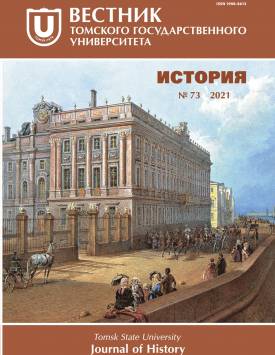Criticism of conformist church activities by soviet propaganda in 1960s-1970s
The purpose of this article is to perform a detailed analysis of the main directions of criticism of religion and church in the USSR, which was actively carried out by all institutions of ideological education and anti-religious propaganda in the 1960s-1970s. Moreover, the author tries to clarify the goals and arguments of this criticism, its content, methods and forms. The article is based on the documents from archives that had not previously been covered in scientific community. The main research methods were general scientific methods (analysis, synthesis, induction, deduction, systems approach, etc.) and general historical approaches (historical-genetic, comparative, problem-chronological, typological, etc.). The author shows that the main trend of the anti-religious propaganda of this period was the criticism of the modernization efforts of church, aimed at the modernization of some elements of worship, ritual and theoretical doctrines. This activity of religious organizations was interpreted exclusively as opportunism, the main purpose of which was the desire to preserve religion and church in a socialist society. The paper studies the way how church was criticized for such modernization activities as changes in child rites, funeral service and confession, which became more available to believers. The statements of religious preachers about the identity of some ideals of communism and the teachings of Christ (these statements provoked particular indignation among Soviet propagandists) that believers are the same creators of socialism, like unbelieving Soviet citizens were also conformist. The calls of church to honest work and the adherence to moral norms and stances were considered doubtful. The attempts of the church to prove that the modern church and religion did not interfere with the development of science were rejected with indignation. The position of church on the struggle for peace was assessed as not entirely sincere and was explained by its desire to form a positive image. In addition, the authorities also criticized the organization of the preaching activity of the church, its attempts to make preaches interesting, relevant and affecting not only the purely spiritual, but also the public interests and needs of believers to take into account the presence of people of various religious degrees and the specific features of the modern church audience during its preparation and organization. The author concludes that the Soviet anti-religious propaganda in 1960-1970s did not accept the attempts of church to fit into social processes, to modernize some aspects of its activities, to become an institution that contributes to the development of society. These efforts were considered not sincere and unsuccessful.
Keywords
religion, church, propaganda, conformism, believersAuthors
| Name | Organization | |
| Soskovets Lyubov I. | Tomsk Polytechnic University | ivitca56@mail.ru |
References

Criticism of conformist church activities by soviet propaganda in 1960s-1970s | Tomsk State University Journal of History. 2021. № 73. DOI: 10.17323/19988613/73/6
